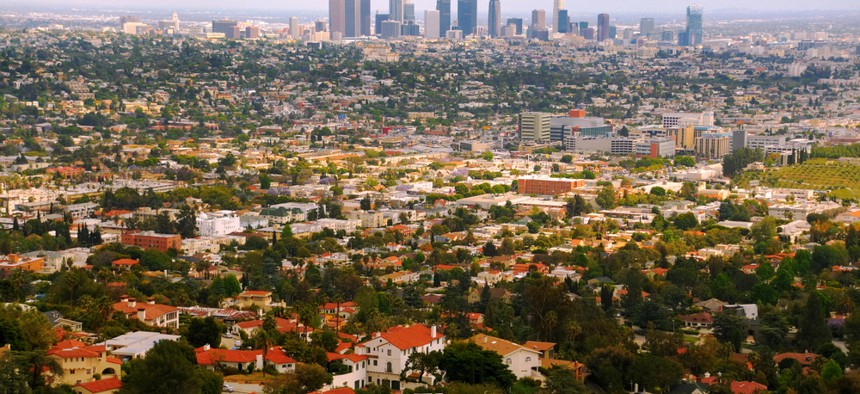Airbnb Talks Up Its Local Benefits in L.A. Amid New Scrutiny

Los Angeles, California shalunts / Shutterstock.com
The popular short-term rental housing company touts its economic impact as cities grapple with regulating the company’s disruptive business model.
LOS ANGELES — What’s not to like about an independent business that supports thousands of jobs and has generated more than $300 million in income for Los Angeles residents over the past year?
It’s a powerful question for cities across the U.S. that are struggling to regulate Airbnb, a popular short-term housing rental company that has disrupted the traditional hotel industry much like Uber famously has done to taxicabs across the nation.
The problem with Airbnb, at least according to some local government officials, is that in cities like Los Angeles, short-term rentals are not taxed, regulated or held to the same standards as competing hotel businesses.
After two members of the Los Angeles City Council called for tougher regulations on short-term rentals last week, Airbnb pushed back with its own study claiming that its business has generated $312 million in economic activity in Los Angeles alone over the past year, supporting some 2,600 jobs.
“Home sharing helps Angelenos stay in their homes, pursue creative careers, and share the city they love with visitors from around the world,” Airbnb Regional Head of Public Policy David Owen said in a press release accompanying the study. “Nearly three quarters of all Airbnb hosts use the money they earn to stay in their homes and about 30 percent of hosts say hosting helped them to start a new business.”
The study made a number of positive economic and environmental claims, arguing that Airbnb hosts earned an average of $660 in supplemental monthly income and that home-shares have a smaller carbon footprint than “traditional accommodation options.”
Airbnb has released about a dozen similar studies from different cities, according to the Los Angeles Times.
The company ran afoul of New York Attorney General Eric Schneiderman, who in October declared that more than 70 percent of Airbnb listings in the city are illegal. In particular, the attorney general singled out residential property owners that exclusively use locations for short-term rentals without paying the city's 14.7 percent hotel occupancy tax.
Airbnb bases the $312 million figure on estimates that its customers spend an average of $1,500 over the course of a 5.6 day visit to Los Angeles. Those are potent, though difficult to verify, numbers as they are based on estimates of spending at local businesses not directly tied to Airbnb services.
The company has also taken criticism from some local residents in areas including Silver Lake and Venice, who have complained that Airbnb proprietors are putting their home-share clients ahead of the needs of residents and community standards.
“The current system, which turns a blind eye to an important industry and its impact on our neighborhoods, our rental stock and the city treasury, works for no one,” Los Angeles City Councilmember Mike Bonin said in his call for tighter regulations on the company.
Bonin and Councilmember Herb Wesson are not alone in their efforts to reel in the short-term housing rental industry. A coalition of elected officials and members from the hospitality industry formed Share Better, to formally support efforts at regulating Airbnb operations in cities like New York and San Francisco.
“Communities across the country are struggling with same problems caused by Airbnb and other illegal hotel operations,” Share Better spokesman James Freedland said in a statement published on the group’s website. “Housing is cannibalized, rents are rising, neighbors and landlords are at risk, laws are going unenforced and taxes uncollected. This is a nationwide phenomenon and that’s why we’re mounting a national campaign to hold scofflaws accountable.”
Still, critics of the largely unregulated home-sharing industry may face an uphill battle against the rapidly growing business model. Not only is Airbnb popular with its users, it’s massively profitable. In April, a private equity group invested $450 million into the company after Airbnb was valued at more than $10 billion, according to the The Wall Street Journal.
(Image by Shalunts / Shutterstock.com)





